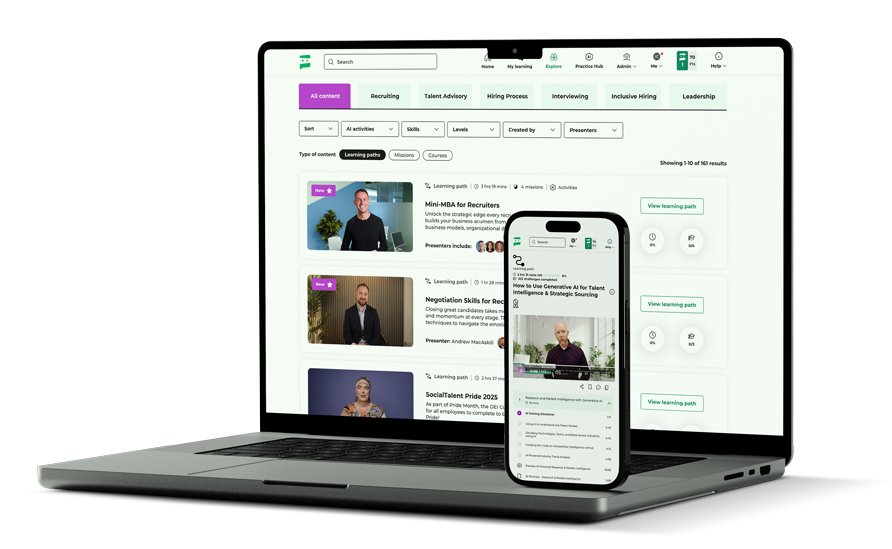By Holly Fawcett
Staying updated on the latest workforce trends is crucial for TA leaders and HR professionals. This week, we delve into three significant developments shaping the talent landscape and get SocialTalent’s own Holly Fawcett’s first-hand takes on these pieces.
- Washington Post: AI-powered recruiters are increasingly screening candidates before any human interaction – streamlining high-volume hiring but raising concerns about fairness and candidate experience.
- HR Brew: US hiring outlook for Q3 is cooling, as economic uncertainty and shifting global trade policies prompt companies to prioritize flexibility over expansion.
- Deloitte: Deloitte’s 2025 Human Capital Trends report urges leaders to balance tech and humanity – leveraging AI to scale performance, not replace people.
Join us as we explore these pivotal insights and their implications for the future of work.
1. To Get Your Next Job, You May Need to Face an AI Recruiter First
Source: Washington Post
Job seekers are increasingly encountering AI-powered virtual recruiters for initial interviews – via text, phone, and video – before ever speaking to a human. These conversational bots, like “Angel” or “Raya,” are reshaping the hiring process by screening candidates 24/7, summarizing interviews, and flagging top talent. While some candidates appreciate the efficiency, others find the experience cold, glitchy, or frustrating – raising questions about fairness, empathy, and how decisions are ultimately made.
Holly Fawcett’s take on this:
“There’s a time and a place for introducing AI into your recruiting process, and it’s largely down to how much of a low/high touch vs low/high value the role needs. Increasingly, I’m seeing organizations utilize AI screening for high-volume hourly roles and having immense success, but where roles are more high skilled and require more of a human touch, candidates are checking out. My TikTok feed has seen too many videos of AI bot interviewers glitch out entirely… It’s not a good look.“
2. Employment Outlook for Q3 Dips as Employers Face Economic Uncertainty
Source: HR Brew
Economic uncertainty is dampening US hiring plans for Q3 2025, with net employment outlook falling to 30%, according to ManpowerGroup. While 44% of employers still plan to hire, many are pausing on non-strategic roles amid shifting global trade policies and tariff instability. HR leaders are urged to look beyond short-term fixes and start planning for long-term workforce needs, especially as demographic changes like retirements add more complexity to an already cautious labor market.
Holly Fawcett’s take on this:
“Every hiring leader I’ve spoken to over the last month has shared their need for flexibility, with so much uncertainty going on. High skilled candidates who require H1B visas are no longer getting those, and so either those jobs go off-shore or aren’t being hired at all. Growth in revenue also majorly dictates investment in hiring, and with the economy on a knife-edge, keeping yourself flexible seems like the best approach to me.“
3. Deloitte 2025 Global Human Capital Trend Report
Source: Deloitte
Deloitte’s 2025 Human Capital Trends report urges leaders to stop deferring decisions and start navigating the complex tensions between business outcomes and human needs. In an AI-disrupted, ever-evolving world of work, success hinges on balancing agility with stability, tech investment with human capability, and short-term gains with long-term value. The report challenges leaders to embrace ambiguity, reimagine roles, and lead for human performance – unlocking sustainable growth by harmonizing people, purpose, and performance.
Holly Fawcett’s take on this:
“Organizations should view AI as a tool to augment human roles, not replace them. Some companies are diving in headfirst, cutting staff and letting AI take over. For example, Salesforce says AI now does 50% of its coding. But rather than replacing half your team, why not use AI to double your output? The real power of AI lies in scaling human performance – helping people do more, not less. This starts with reimagining roles, embracing ambiguity, and leaning into skills like learning agility. We should automate low-value or neglected tasks – like parts of the candidate experience – so humans can focus where they add the most value. AI should help us perform better, not disappear.“




